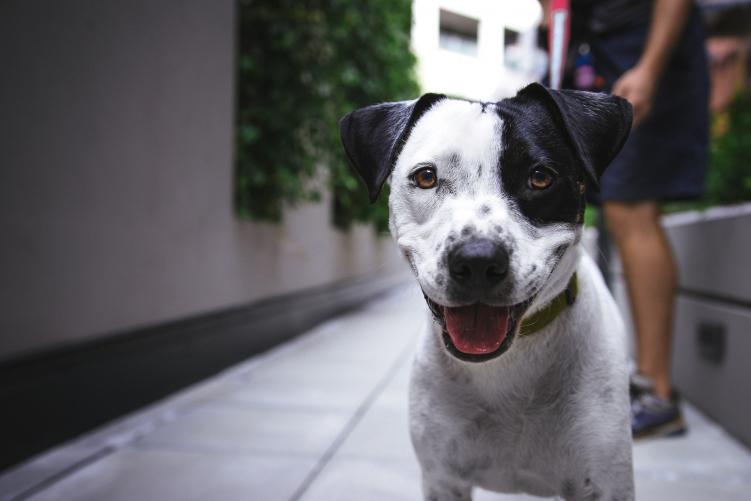There have been many studies to suggest that getting a dog can improve your mental health and outlook on life. It is an exciting prospect, and the companionship that they provide is completely unique to their species.
When it comes to finding the right four-legged friend, there are a few things that you will need to think about. Make sure you are using the following points to make the most appropriate decision about which dog would be the perfect companion for you.
Activity Level
Firstly, you will need to think about how much or little activity a particular dog needs. Make sure you are being realistic about whether you are able to walk them multiple times per day if needed.
Some dogs need a little more engagement than others, and would not be suitable for people who spend long periods of time out of the house. If you want a dog that is a little more easygoing in terms of exercise, you could consider breeds such as Bassett hounds.
For someone who wants a dog to run beside them, you could get a more agile companion like a collie. When you want to get a dog, it is important to think about how frequently you can engage with them during a typical week. Some breeds require more mental stimulation than others and are more likely to become mischievous if they are left alone.
Size
Another essential factor when you are choosing a dog should be their size. Larger breeds such as Bernese mountain dogs or Bullmastiffs have different benefits and drawbacks in comparison to smaller dogs.
You should consider whether your home and backyard have the physical space available for a larger dog. There is no point in choosing a huge dog that cannot move freely in your home without knocking things over. Smaller breeds, including pugs, are a little more vulnerable to injury from being accidentally stepped on or mishandled.
However, larger dogs will need higher quantities of supplies such as dog food. It is worth comparing the different pros and cons of different sized dogs before adding a particular breed to your home.
Age
It is also crucial that you decide whether you want an older dog or a puppy. Puppies tend to be more expensive, and you will need to be wary of competitive breeders. On the other hand, older breeds can be more challenging to engage in obedience training.
While you may not have as many years to enjoy their company, a senior dog can also be a great addition to your family. Sadly, these are the most frequently overlooked dogs in many animal shelters. Consider giving an older dog a loving home by checking with your local shelter.
Maintenance
You should also consider how much maintenance will be needed for your new dog. As mentioned previously, some breeds require regular mental stimulation, while others are more laid back. Make sure you find the right dog for your lifestyle so that you don’t have to massively change your routine.
Additionally, it is worth thinking about the costs associated with each dog breed. This can include regular check-ups and grooming. Try to think realistically about how much regular maintenance you can afford before choosing a dog.
Research!
Now is the time to start researching and comparing different breeds, size categories, activity requirements, and personalities to find the perfect companion for you. https://petdt.com is a useful place to begin researching and comparing your options for your next pet.
You can also use this to find breeds that are suitable for allergies if you suffer from these, or if a particular dog breed is known for being child-friendly.
Summary
Consider the needs of your individual household and make sure you find a dog that will be the right fit. A dog can be a perfect addition to your family if you are looking for a companion or adventure buddy.
Because each dog has a slightly different temperament and living conditions, it is critical that you are finding the right breed for you. For example, someone who lives in a compact apartment may not be the most suitable home for a very large dog.
Avoid getting a dog that has very specific needs that do not fit in with your lifestyle. This can lead to you needing to alter your routine in some way to accommodate your furry companion. Try to avoid doing this as much as possible.


There have been many studies to suggest that getting a dog can improve your mental health and outlook on life. It is an exciting prospect, and the companionship that they provide is completely unique to their species.
When it comes to finding the right four-legged friend, there are a few things that you will need to think about. Make sure you are using the following points to make the most appropriate decision about which dog would be the perfect companion for you.
Activity Level
Firstly, you will need to think about how much or little activity a particular dog needs. Make sure you are being realistic about whether you are able to walk them multiple times per day if needed.
Some dogs need a little more engagement than others, and would not be suitable for people who spend long periods of time out of the house. If you want a dog that is a little more easygoing in terms of exercise, you could consider breeds such as Bassett hounds.
For someone who wants a dog to run beside them, you could get a more agile companion like a collie. When you want to get a dog, it is important to think about how frequently you can engage with them during a typical week. Some breeds require more mental stimulation than others and are more likely to become mischievous if they are left alone.
Size
Another essential factor when you are choosing a dog should be their size. Larger breeds such as Bernese mountain dogs or Bullmastiffs have different benefits and drawbacks in comparison to smaller dogs.
You should consider whether your home and backyard have the physical space available for a larger dog. There is no point in choosing a huge dog that cannot move freely in your home without knocking things over. Smaller breeds, including pugs, are a little more vulnerable to injury from being accidentally stepped on or mishandled.
However, larger dogs will need higher quantities of supplies such as dog food. It is worth comparing the different pros and cons of different sized dogs before adding a particular breed to your home.
Age
It is also crucial that you decide whether you want an older dog or a puppy. Puppies tend to be more expensive, and you will need to be wary of competitive breeders. On the other hand, older breeds can be more challenging to engage in obedience training.
While you may not have as many years to enjoy their company, a senior dog can also be a great addition to your family. Sadly, these are the most frequently overlooked dogs in many animal shelters. Consider giving an older dog a loving home by checking with your local shelter.
Maintenance
You should also consider how much maintenance will be needed for your new dog. As mentioned previously, some breeds require regular mental stimulation, while others are more laid back. Make sure you find the right dog for your lifestyle so that you don’t have to massively change your routine.
Additionally, it is worth thinking about the costs associated with each dog breed. This can include regular check-ups and grooming. Try to think realistically about how much regular maintenance you can afford before choosing a dog.
Research!
Now is the time to start researching and comparing different breeds, size categories, activity requirements, and personalities to find the perfect companion for you. https://petdt.com is a useful place to begin researching and comparing your options for your next pet.
You can also use this to find breeds that are suitable for allergies if you suffer from these, or if a particular dog breed is known for being child-friendly.
Summary
Consider the needs of your individual household and make sure you find a dog that will be the right fit. A dog can be a perfect addition to your family if you are looking for a companion or adventure buddy.
Because each dog has a slightly different temperament and living conditions, it is critical that you are finding the right breed for you. For example, someone who lives in a compact apartment may not be the most suitable home for a very large dog.
Avoid getting a dog that has very specific needs that do not fit in with your lifestyle. This can lead to you needing to alter your routine in some way to accommodate your furry companion. Try to avoid doing this as much as possible.
Related Content: